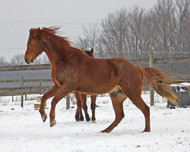How do horses in snow cope with the freezing conditions, particularly if you bravely have them living out through the winter?
Brrrr! This weekend’s cold snap had lockdown families out with their sledges (socially distanced hopefully!) revelling in some snowy fun, but those of us with horses were left worrying. Yes, we’ve all seen those images on social media of horses and ponies frolicking in the snow, rolling, playing and galloping about in the white stuff, but do they really enjoy it? Should we be keeping them in, and rugging them up as much as possible – possibly even moving heaters into the barn?
Then there’s the issue of keeping water buckets unfrozen.
Can horses in snow stay warm … even outdoors?
How Horses in Snow stay Warm
We’re generalising here (a lot depends on the animals acclimatising to their normal environment, and of course their breed), but horses – warm-blooded animals – are good at thermoregulation and can happily tolerate quite a wide range of temperatures, from several degrees below freezing to around 20 °C.
They are helped by their skin which is naturally designed to fend off the cold. The top layer is the waterproof epidermis, below which is the hypodermis where insulating fat is stored. The skin exudes oils which keep it waterproof, so its best not to groom your horse too much in cold weather because you may brush or wash away these essential oils.
The coarse winter equine coat is also designed to retain heat, act as a windbreak and be waterproof, with outer hair and a soft layer of down beneath. The hair also traps heat by a process called piloerection – just like human gooseflesh – which makes the hairs stand erect providing insulation.
You may be especially worried by the exposure of your horse’s soft nose and vulnerable legs. Rest assured his nose is well supplied with blood vessels to keep it warm, and his legs have no muscles below the knee, meaning there is minimal blood circulation in those extremities to carry away heat.
As for horses in snow suffering from cold feet – well, nature has provided a strategy called “direct shunt” which lets blood access the hoofs directly through the larger vessels, rather than capillaries, driving warmth into the hoof.
Extra Calories for Horses in Snow
Most important for keeping the cold at bay for your horse is to make sure he is receiving enough calories in his feed to provide the energy he needs to maintain his core temperatures. According to the Equine Science Centre the average horse living out needs about 25% more energy intake during the coldest winter months.
This means they need plenty of forage fed to them, in the form of high quality, dry, fresh hay. They should also have access to salt and unlimited ice free water.
There are many tips around online as to how to keep your horse’s water unfrozen … some work, some don’t! Everything from putting a ball in the water bucket to using trough heaters and insulated buckets. If you have a good tip, we’d be happy to hear it!
Shelter and Rugging for Horses in Snow
Your horse may well be fine living out in the winter – even enjoying the snow – as long as he is metabolically healthy, gets enough calories, and has a good winter coat, but he will certainly appreciate a shelter to protect against wind and rain, which may be the hardest thing for him to tolerate. A field shelter is therefore highly recommended.
When it comes to the eternal rugging debate, conventional wisdom is not to use thick rugs on horses unless they are thin, young or clipped, because over-rugging can interfere with the horse’s natural thermoregulation strategies, cause bacterial skin disease and lead to weight loss and loss of condition. If you do use a rug, do so mainly for protection from the elements rather than warmth, and monitor closely what’s going on beneath the rug.
No-one knows your horse as well as you do, so rugging is pretty much a case of catering to the individual horse’s needs – and you have to be the judge. Just remember, you can’t judge a horse’s resilience to the cold the way you do your own – his metabolism is different and he wears a permanent fur coat!
Horses DO shiver with cold, but usually only if they are wet. Snow is less likely to trigger shivering than rain when temperatures plummet. So, if you see your horse shivering dry him off and put him in shelter for awhile.
We hope your horse enjoys the snow, and has a happy, healthy winter! Here at Totally Tack we’re qualified to advise on all facets of horse care, so if you have concerns about your horses in snow, don’t hesitate to get in touch!



